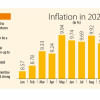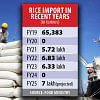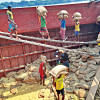Food makers’ sales growth halves amid higher inflation

Bangladesh's economy has been facing tough times of late as sustained high inflation, hike in interest rates and massive devaluation of the local currency continue to plague the country. In this series, we take a look back at how various industries fared amid the crisis in fiscal year 2022-23. Here, in the fifth instalment of the series, we placed listed food makers under the scanner.
The sales growth of listed food and allied companies halved in the last financial year despite an upward adjustment of prices, indicating a cut in consumption as people suffered from high inflation.
Twelve food companies listed on the Dhaka Stock Exchange have published their financial reports for 2022-23.
The reports showed that their combined sales rose 10.7 percent year-on-year to Tk 3,837 crore in the year. The growth stood at 20.7 percent in 2021-22.
Of them, sales of Apex Foods plunged 31 percent, Bangas witnessed a 10 percent decline, National Tea saw a sales fall of 10 percent, and Lovello Ice Cream's sales dropped 2 percent.
A top official of a biscuit manufacturer said the demand for processed foods declined due to higher inflation.
The Consumer Price Index rose 9.02 percent in 2022-23, the highest in 12 years.
However, the sales growth of the company was strong in FY23 as it operates in the low-end segment, the official said.
He said the industry's sales growth decelerated despite adjusting prices in line with a hike in input costs.
"This means people are consuming less amid the erosion of purchasing power."
He said the companies that deal in the high-end segment, with most of them not listed, have definitely seen a fall in demand.
In the annual report, Bangas Managing Director Md Rafiqul Haque said turnover declined owing to post-Covid-19 effects, geopolitical tensions stemming from the Russia-Ukraine war, supply chain disruptions, and a spike in input costs.
So, consumers were unwilling to purchase items other than basic products and this had a significant impact on the decreasing turnover, he added.
Of the major food and allied companies, Olympic Industries clocked 20 percent year-on-year higher sales in FY23. Pran AMCL's sales grew 2 percent.
Kamruzzaman Kamal, marketing director at PRAN-RFL Group, highlighted the challenges that the supply chain confronted in the last fiscal year amid the fallout of the coronavirus pandemic and the war.
"As a result, exporting products was tougher," he said.
There was a shortage of container and mother vessels while the freight costs surged. On the other hand, raw material prices soared.
"All of these contributed to the higher prices of food items," Kamal said.
According to the official, export destinations are quite price-sensitive, so the sales fell.
The impact was comparatively low in the local market as products were resized in many cases to keep the prices unchanged, he said.
The combined profits of the listed food companies rose 28 percent year-on-year to Tk 127 crore in the last financial year.
Apex Food's financial report showed that its sales dropped as the demand for shrimps fell, along with prices, amid the war and an elevated level of inflation globally.
The company owns and operates a shrimp processing plant and exports 100 percent of its products.
The prices of Bangladeshi shrimp dropped 24 percent in FY23, said Shahriar Ahmed, managing director of Apex Foods, in the annual report.
In most cases in Bangladesh, shrimp farming is done in a traditional way. So, production stands at 300-400 kilogrammes per hectare, the lowest in the world. If farming follows the scientific method, output will be 3-4 tonnes per hectare, the report said.
Unlike leading exporters such as China and Vietnam, Bangladesh is still unable to produce higher value-added frozen shrimp products, which have higher demand abroad, Ahmed added.

 For all latest news, follow The Daily Star's Google News channel.
For all latest news, follow The Daily Star's Google News channel. 








Comments